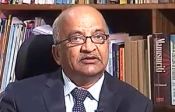 |
|
|
||||
BUDGET REACTIONS 2014-15
 |
BV Kumar, Former Member, CBEC FM has lost an opportunity to bring about reforms in Indirect Taxes. Though much was spoken about tax reforms, simplifying tax structure and abolishing Inspector Raj, there is hardly any visible changes in the Law and the Procedures relating to Indirect Taxes. The only change that is good is amendment to Sec. 129 E of Customs Act, 1962 and Sec. 35 F of the Central Excise Act, 1944. The pre-deposit for filing an Appeal before Commissioner Appeals could have been kept at 5% instead of 7.5%. Further, the Commissioner Appeals and the Tribunal could have been given powers to waive the pre-deposit to admit the Appeal where a prima facie case is made out by the Appellant. In any case the amendment would prevent pervert orders being passed at the Stay stage. No effort has been made to remove anomalies such as Rule 2 (C)(k)(B)(b) of CCR 2004 which excludes "laying of foundation or making of structures for support of capital goods", within the scope of, inputs. The FM has ignored modern construction of factories which go vertical and where the transportation of inputs is done on conveyor belts or finished products moved on overhead mobile cranes. Similarly, the Provisions of Sec. 114A of the CA, 1962 and Sec. 11AC of the CEA 1944 has not been deleted inspite of the fact that the adjudication authorities ignore the facts of the case and ignoring the judicial decisions routinely invoke the above provisions. To say that 45 days of office is not enough for the ruling party to bring about tax reforms is a lay man's excuse. They should have given a mandate to TRU/Budget Division that the obnoxious Provisions of Law which are anti-growth/ anti-business should be removed and that is the object of the Govt. With the help of think tanks and feed backs received from the public they could have done this. |
|
 |
Prof. R Venkata Rao, Vice-Chancellor, National Law School of India University, Bangalore Well begun. A budget with the 21st century mindset.One can only fervently hope that it is not an exercise in flattering to deceive. |
|
 |
Naresh Takkar, MD & CEO, ICRA Ltd The tone of the Budget for 2014-15 is growth-positive, particularly measures such as the incentives to boost long-term lending for infrastructure, rationalization of various taxes, and the assurance of a stable and predictable tax regime, which would support business sentiment and provide the foundation for an economic recovery. Additionally, the focus on fiscal prudence and roadmap for consolidation with the commitment to reduce the fiscal deficit to 3.0% of GDP by 2016-17 are encouraging. In contrast to market expectations, the fiscal deficit target of 4.1% of GDP that had been announced in the Vote-on-Account in February 2014, has been retained in the Budget for 2014-15. We maintain our view that achieving this target would be challenging, given the optimistic assumptions for nominal GDP growth (13.4%) and net tax revenue growth (20% relative to provisional data for 2013-14), in light of the unfavourable progress of the south west monsoon over the previous five weeks and the exemptions that have now been provided under personal income tax. We look forward to additional clarity on a roadmap for the transition to the much-awaited goods & services tax and efforts to improve targeting of subsidies in order to free-up resources for more productive capital spending. |
 |
Prof. Aman Agarwal, Director IIF Finance Minister Shri Arun Jaitley has presented a Well Balanced Budget rightly focusing on Fiscal Consolidation, Agriculture / Agro Industry Growth, Manufacturing sector (including MSME), Infrastructure Growth (including power, railways, roadways and rural development), Agriculturalists & Senior Citizen's Dignity, Empowering Youth with more Employment Opportunities, giving due attention to Regional and Border areas, targeting Foreign Policy with a focus to strengthen INR (Rupee), strengthening Banking Sector along with reduction in NPAs and providing for a congenial environment for Foreign Investment in India. The budget would help target Inflation and Fiscal Deficit through induced growth and financial inclusion. Budget is expected to provide necessary impetus to boast growth by 1.5% to push India's GDP 2014-15 to be around 6.50% as against 5% currently. |